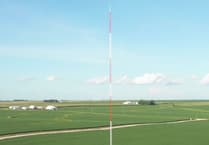The Welsh Parliament is set for a series of crunch votes on contentious plans to expand the Senedd and reform the electoral system.
MSs will vote on more than 120 amendments to the Senedd Cymru (Members and Elections) bill during a stage-two debate on Tuesday and Wednesday.
Opposition amendments include calls for a referendum on the reforms, changes to the proposed electoral system and the introduction of a mechanism to recall members.
Under the bill, the size of the Senedd would increase from 60 to 96 members who would be elected via a full form of proportional representation.
The 32 constituencies that will be used in the next general election would be combined to create 16 for the 2026 Senedd poll, with each returning six members.
Referendum
Darren Millar, the Conservatives’ shadow constitution minister, has tabled dozens of amendments, including making the reforms subject to a public referendum.
On the eve of the two-day debate, Mr Millar reiterated his party’s criticism, saying people want more doctors, nurses, dentists and teachers – not more politicians.
The Conservative described the bill as a Labour-Plaid Cymru pet project which is wasting £120m of taxpayers' money during a cost-of-living crisis.
He said: “The people of Wales deserve to have their say and we will continue to resist any legislation that will undermine our democracy.”
The Tories have also tabled amendments – backed by Jane Dodds, the Lib Dems’ leader in Wales – to change the proposed electoral system.
Closed lists
Under the bill as drafted, future Senedd elections would use a closed-list system which would see the electorate voting for parties rather than specific candidates.
Concerns have been raised that this places too much power in the hands of political parties which would decide the order of their candidates on eight-name lists for each constituency.
Laura McAllister and Alan Renwick, the architects of initial 2017 proposals, have warned that giving voters less power is dangerous and risks fuelling public disaffection with politics.
Opposition amendments propose a flexible-list system which would give people more say – with candidates receiving more than 10% of votes for their party leaping to the top of the list.
If agreed, Conservative amendments would also introduce a mechanism to allow voters to remove MSs between elections by signing a recall petition.
Ballot papers and by-elections
Ms Dodds has put forward amendments which would ensure candidate names are on ballot papers and by-elections are held for vacant seats which would not otherwise be filled.
The Lib Dem said the bill represents a rare window of opportunity to renew and revitalise democracy which Wales can ill-afford to miss due to party politics.
She said: “By reforming the Senedd and expanding membership, we would be able to offer an effective legislature that provides the robust scrutiny expected by the people of Wales.
“However, we are at serious risk of missing out on this due to the widely criticised closed party list proposal from both the Labour Welsh Government and their Plaid Cymru partners.”
Ms Dodds, who represents Mid and West Wales, added: “I will continue to push for a more proportionate system that puts power back into the hands of voters – not party bosses.”
‘More democratic’
Mick Antoniw, Wales’ constitution minister, who is the member in charge of the bill, said the proposals implement the recommendations of a 2022 committee report on Senedd reform.
He described the debate, which could see the Senedd sit as late as 9.30pm on Tuesday, as an important part of the process of further shaping the bill.
Mr Antoniw said Welsh ministers have tabled amendments in response to Senedd scrutiny, adding: “MSs have put forward their own amendments and we look forward to the debate.”
A Plaid Cymru spokesperson argued the bill will create a stronger, more democratic and representative Senedd which is better able to make a positive difference to people’s lives.
The spokesperson said: “Once passed, the Senedd reform bill will also place Welsh democracy on firmer foundations and bring us closer to the size of the legislatures in Scotland and the north of Ireland.
“This stands in stark contrast to the way in which Wales’s representation on a UK level at Westminster is being weakened.”
Capacity and constituencies
Mike Hedges stressed the importance of increasing the Senedd’s capacity.
The Labour backbencher raised the example of the four-member finance committee, warning that meetings cannot proceed if one MS is ill and another is held up in traffic.
Mr Hedges said: “Moving to 96 members would produce 24,464 electors per member, which is approximately midway between Scotland and Northern Ireland.”
The Swansea East MS reiterated concerns about the potential size of some Senedd seats, particularly any paired with the Brecon, Radnor and Cwmtawe parliamentary constituency.
He said: “Whichever way of creating a six-member constituency is used, the constituency would be very large and involve communities with very little in common.”
Legislative hurdles
The 126 amendments will be considered by a Committee of the Whole Senedd, which is expected to be chaired by Elin Jones, the Senedd’s speaker or Llywydd.
In the event of any tied votes – a relatively common occurrence in this Senedd term – the speaker would be required by the rules to use her casting vote against amendments.
Stage three, which will see further amendments debated, is expected to be held in late April, with stage four – a vote to pass the final text – pencilled in for early May.
Unlike at earlier stages, the final vote will require a supermajority of two-thirds support in the Senedd – with the speaker and her deputy able to vote freely.
The reforms, which were not possible last term due to the parliamentary arithmetic, are expected to proceed with Labour and Plaid Cymru now having the required numbers.
The bill could receive Royal Assent and become an Act in June.





Comments
This article has no comments yet. Be the first to leave a comment.